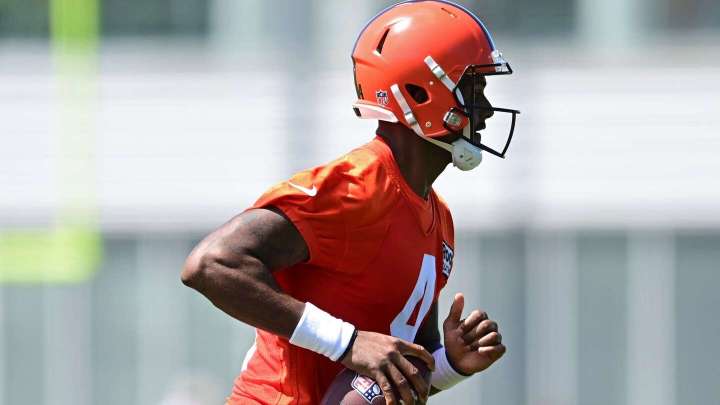Deshaun Watson’s inadequate six-game penalty for sexual misconduct is nevertheless the NFL’s cleanest judicial process yet under Roger Goodell — and that’s a terrible thing to say. You know you’re in a snarl-up when the NFL may decide to appeal to itself over the actions of the judge it helped appoint. The skeins of illogic in this matter will only create even greater knots in Goodell’s necktie. But maybe an injustice in this instance will help prevent future extreme swings of the NFL injustice pendulum.
Let Deshaun Watson’s imperfect justice be a lesson to Roger Goodell’s NFL

Watson’s punishment, levied by former judge Sue L. Robinson, is shockingly light, but at least it was issued by a neutral and independent arbiter, and that made her ruling worthy of more respect than the previous commissariat proceedings conducted by the self-interested Goodell. It’s a terrible choice, isn’t it? What’s better: to let Goodell have full, heavy-handed dominion or to seek some restraint on his power and wind up with a semi-walkaway like Watson’s? It sticks in the throat to say it, but the latter version of imperfect justice is better.
The only reason Robinson was even in position to hand down a penalty to Watson was because NFL players had come to so distrust Goodell’s motives that they insisted on some form of independent adjudication in the 2020 collective bargaining agreement. The appointment of Robinson, formerly of the U.S. District Court, was mutually agreed on by the NFL and the NFLPA, and now the league can live with her. Or, if Goodell wants to exercise his lingering role as appellant overlord to unilaterally impose a stricter penalty, he can deal with the vehement legal response — and explain in open court the difference between his treatment of Watson and Washington Commanders owner Daniel Snyder for overseeing a franchise rife with serial sexual harassment.
Robinson’s reasoning in her 16-page decision is fascinating for the fact that she finds not one but two guilty parties: In the first half she finds Watson guilty of unwanted sexual contact, and in the second half she finds the league guilty of capricious standards. What is proportional punishment? That should not have been so difficult of a question in Watson’s case — except that it was because of the league’s history of handing out six-game love taps to even its most violent offenders against women.
As Robinson pointed out, in the NFL “by far the most commonly-imposed discipline for domestic or gendered violence and sexual acts is a 6-game suspension. Only two players have been suspended for 8 games, one for multiple incidents of domestic violence and the second for the assault of multiple victims.”
Let’s be clear: The NFL proved its case that Watson had imposed unwanted sexual contact on multiple massage therapists, and he has settled 23 civil complaints. But the judge could see no precedent — as a fundamental matter of legal fairness — by which she could give Watson the full year’s suspension that the league sought, thanks to the whole lousy walk-up to this case, dating from Goodell’s decision to give Ray Rice just two games for slugging his future wife in 2014. She found the NFL’s seeking of a year-long suspension against Watson was more a response to “public outcry” than in keeping with its policy.
“Here, the NFL is attempting to impose a more dramatic shift in its culture without the benefit of fair notice to — and consistency of consequence for — those in the NFL subject to the Policy,” Robinson wrote.
Why do precedent and proportionality matter? Preet Bharara, the former U.S. attorney for the Southern District of New York, answered the question better than anyone in his book “Doing Justice.”
“People will regard a result as just if they regard the process leading to it as fair and if they believe the people responsible for it are fair-minded,” he wrote. “It is often said that justice not only must be done but also must be seen to be done.”
Nothing in the NFL’s player penalties in recent years has seemed fair in process or fair-minded. Goodell’s imposition of “discipline” — an infantilizing word for adult workplace conduct — has veered between politically calculating and choleric. He either issues puffs of air or decisions with the nuance of a press gang. Mostly he seems to care about shifting public opinion.
The NFL is the victim of its own terrible mistakes in previous highly charged cases. It wound up with a judge who treated the question of Watson’s penalty as she would a case in court and refused to exercise too much latitude. That is to be expected when you hire a retired federal judge. Good judges try not to wilt or bend with popular outrage — that’s not a system, frankly, any of us would want to live in. As the NFL demonstrates, it’s one that swiftly devolves into incoherence, with penalties alternately cruel and toothless.
What you want in a judge, or an arbiter of anything, is someone evenhanded, with a decent sense of previous context. Whatever you may feel about the wisdom of Robinson’s decision, she was at least operating in a context. “I am bound by standards of fairness and consistency of treatment among players similarly situated,” she wrote.
No one can feel good about the lightness of the penalty. But you might feel a great deal worse if you had to work in a world without consistency-seeking judgments.






